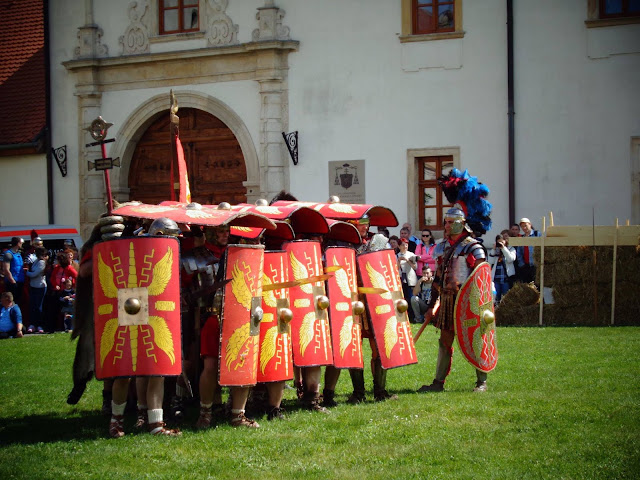We recently went to a Roman Festival (it's like a Medieval
Festival, but Roman...you get it) with some friends, and it was very cool (in the historical/craftman-ship sense of "cool").
Roman history is very contextualized here since Romanians claim that they are the descendants of
intermarriages between the Romans and the Dacians, an Indo-European people living
around the Danube and the Carpathians in the centuries BC. As the story goes, the Dacians were
always a threat to the Roman province of Moesia (present day Serbia, Macedonia,
and parts of southern Romania and Bulgaria), and in 85 AD, they actually raided several big cities and killed the
governor. Emperor Domitian led a hastily-planned campaign against the Dacians
in which the Dacian general Decebal
defeated the Roman legions initially, and eventually agreed to a peace treaty.
Decebal became a client of Rome and was given a lot of
money and weapons to defend the border, but was still fairly antagonistic
towards Rome. This, plus the fact that most of the Dacian warriors had swords
(Rome usually won because the folks they were fighting didn't have many swords)
made the new emperor Trajan nervous, so he marched on Dacia in 101. Decebal asked again for
peace, and then initiated a revolt, so Trajan sent troops back in 105. The
Dacians put up a good fight and even repelled the first attack on their main
city, Sarmizegetusa, but a treasonous nobleman helped the Romans to destroy the
water pipes and the city eventually fell. Decebal escaped humiliation and killed himself before the
Romans got to him, along with many other city inhabitants.
Trajan was really glad to have this border of the empire
secure and to procure Dacia's rich gold mines (if you read about Rosia Montana,
that's an old Roman/Dacian mine), so he declared 123 days of celebrations. He
also erected what we now call Trajan's Column in Rome, telling the story of the
Dacian wars. A lot of historical information about the Dacians comes from their
depictions on the column, which you can visit today if you ever find yourself
in Rome.
Dacia became a province of Rome for 170 years before it became too hard to defend and the Roman legions left. Most of the population stayed, however, and the mix of Roman and Dacian people became what we now call Romanian. While the Romanian language is mostly Latin based, it still has some words that people say are Dacian (for example "dor," the word that describes the state of missing someone or something).
All that to say, no Roman festival in Transylvania would be complete without
Dacians, and the festival actually ended with a fight between all the Roman legions and the Dacians. There were a lot of re-enactments, a lot of really skilled metal, wood and leather workers, and a lot of friendly animosity between the Romans and Dacians.
The Dacians had curved swords which the Romans called "falx." The sharp side is on the inside of the curve, making the weapon like a cross between a sword, an axe and a hook. They were very effective at getting around Roman shields, or cutting right through them:
The Romans actually had to reinforce all of their helmets on the brow after the first fight with the Dacians because of how effective the falx was a breaking them.
We talked to a leather worker from Rome for a while and he showed us how to join, sew and put on leather sandals, socks and bracelets.
There were some military drills, first by the Romans showing off how cool their shields are:
Yes, the standard bearer is a true BEAR-er. He's wearing a bear skin on his head.
Then the Dacians presented themselves and did some archery practice.
Then, there was a gladiator re-enactment group from Italy who actually fought with armor and weapons modeled after historical records. These guys were actually fighting, so they used dulled blades, but they all came away with some bruises and cuts.
And then, the final battle. The Roman legions marched on Sarmizegetusa, and the Dacians bravely defended their homeland.
It had been raining gently throughout the whole battle, but when it was almost finished, it started pouring and dumping half-formed hail on us, so we beat a very dishonorable retreat to the car and drove back home. Next time we'll come with more wild warrior spirit and watch the fight to the end, come what may, but for now we're happy to just play dress-up.
Our friend Adi who told us about the festival.












No comments:
Post a Comment